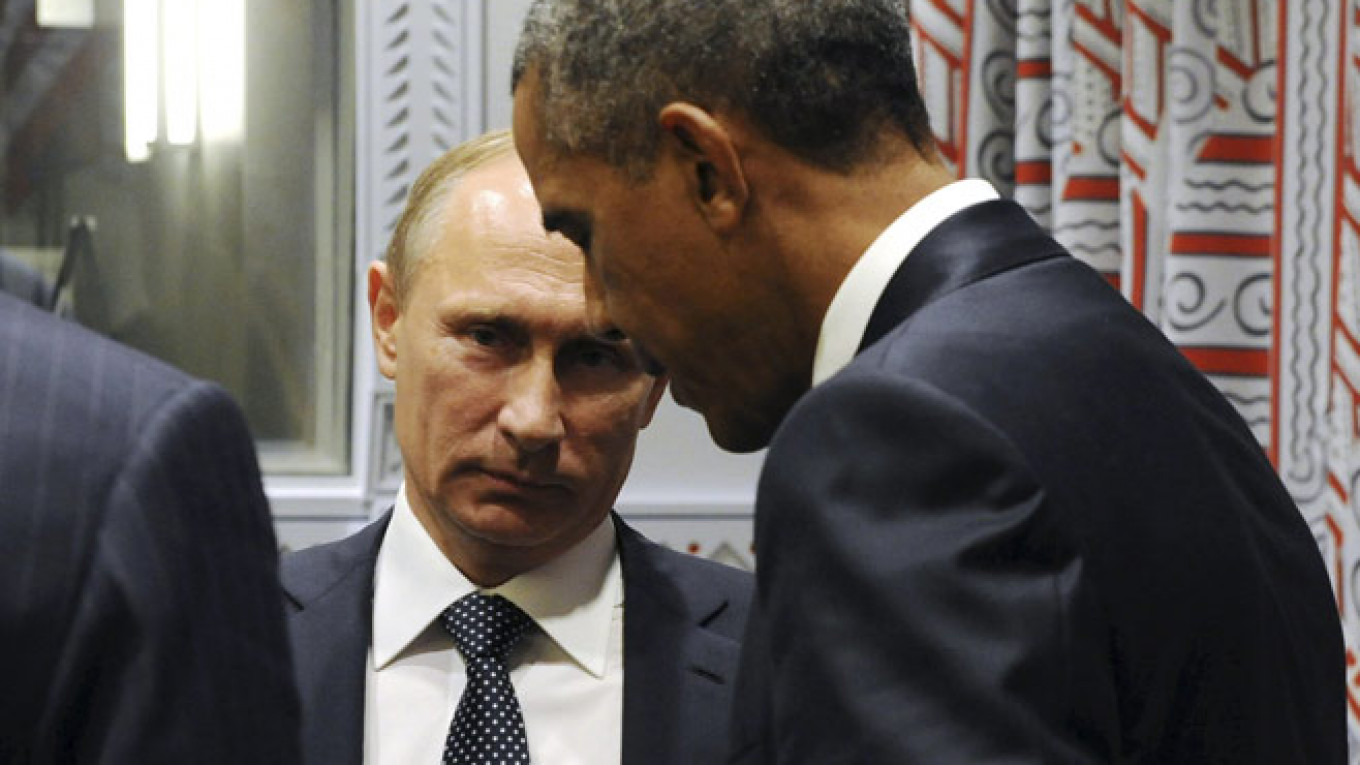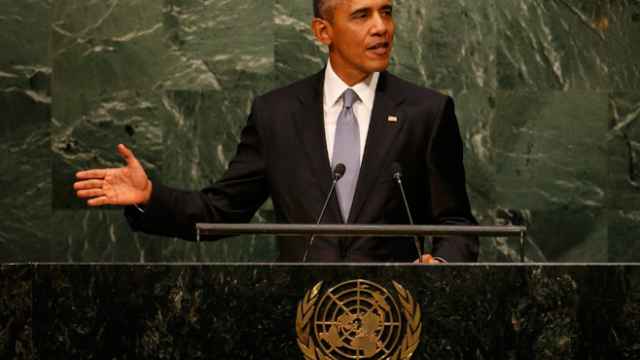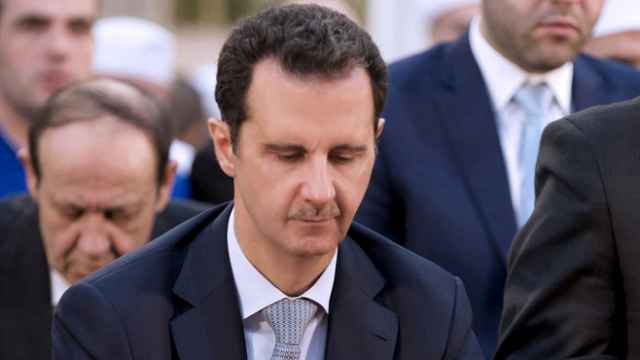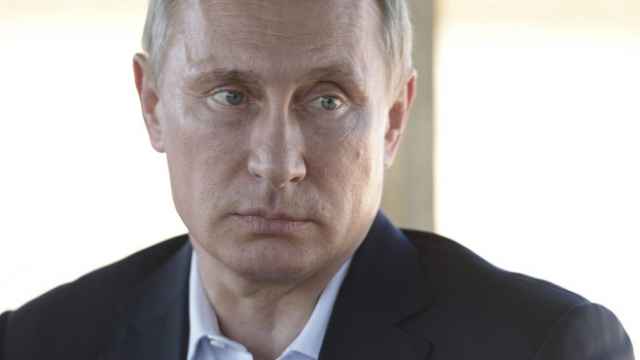Russia and the United States agreed on Monday to look for a diplomatic end to the Syrian civil war but clashed over the central question of whether Syrian President Bashar Assad should retain power.
During a 90-minute meeting, U.S. President Barack Obama and Russian President Vladimir Putin agreed that their armed forces should hold talks to avoid coming into conflict in Syria after a Russian military buildup there over the last several weeks.
The United States, France and allied countries are bombing Islamic State militants, who have exploited power vacuums to seize parts of Syria and neighboring Iraq as part of a stated goal of creating an Islamic caliphate.
The reinforcement of the Russian military presence in the country, including the addition of tanks and warplanes, has brought fears of inadvertent or accidental clashes among the forces as well as U.S. questions about Moscow's main goal.
Speaking after his meeting with Obama, Putin told reporters Russia was pondering what more it could do to support Syrian government and Kurdish forces against Islamic State militants.
"We are mulling over what we would really do extra in order to support those who are in the battlefield, resisting and fighting with terrorists, ISIS [Islamic State] first of all," Putin said, ruling out deploying Russian ground troops.
"There is [an] opportunity to work on joint problems together," Putin said of his talks with Obama, which a U.S. official described as "businesslike."
A senior U.S. official, speaking on condition of anonymity, told reporters after the meeting: "The Russians certainly understood the importance of there being a political resolution to the conflict in Syria, and there being a process that pursues a political resolution."
Clinking Glasses, Frosty Looks
U.S.-Russian ties have been deeply strained by Moscow's March 2014 annexation of Crimea from Ukraine and its support of pro-Russian separatists in the eastern part of the country.
Earlier in the day, relations between the two leaders appeared frosty — they clinked glasses at a lunch, but Obama had a piercing look as Putin smiled — and they laid out starkly differing positions toward Assad in their addresses before the annual United Nations General Assembly gathering of world leaders.
Obama said he was willing to cooperate with Russia and Iran to try to end the four-year civil war in Syria, in which at least 200,000 people have died and millions have been driven from their homes. But he described Assad as its chief culprit.
In contrast, Putin said there was no alternative to cooperating with Assad's military to fight Islamic State militants, and called for the creation of a broader international anti-terrorist coalition. This appeal may compete with the coalition that the United States has assembled to fight Islamic State.
"The United States is prepared to work with any nation, including Russia and Iran, to resolve the conflict," Obama, who spoke before Putin, told the world body. "But we must recognize that there cannot be, after so much bloodshed, so much carnage, a return to the prewar status quo."
Obama: No Role for Tyrants
Obama did not explicitly call for Assad's ouster, and he suggested there could be a "managed transition" away from the Syrian president's rule, the latest sign that despite U.S. animus toward Assad it was willing to see him stay for some period of time.
Obama dismissed the argument that authoritarianism was the only way to combat groups such as Islamic State, saying: "In accordance with this logic, we should support tyrants like Bashar Assad, who drops barrel bombs to massacre innocent children, because the alternative is surely worse."
Putin differed, suggesting there was no option but to work with Assad, a longtime ally of Russia.
"We think it is an enormous mistake to refuse to cooperate with the Syrian government and its armed forces who are valiantly fighting terrorism face-to-face," Putin said in his speech.
"We should finally acknowledge that no one but President Assad's armed forces and [Kurdish] militia are truly fighting the Islamic State and other terrorist organizations in Syria," he said.
French President Francois Hollande and Turkish Prime Minister Ahmet Davutoglu both rejected the possibility of allowing Assad to stay.
Bitter Pill
In voicing a willingness to deal with Iran and Russia, both backers of Assad, Obama was openly acknowledging their influence in Syria and swallowing a somewhat bitter pill for the United States.
Tehran has armed the Syrian government and, through its backing of Lebanese Hezbollah fighters, has helped Assad combat rebels seeking to end his family's four-decade rule.
U.S. officials say they believe Putin's buildup of Russian forces in Syria mainly reflects Moscow's fear that Assad's grip might be weakening and a desire to shore him up to retain Russian influence in the region.
They also see it as a way for Putin to try to project Russian influence more widely, a goal he appeared to achieve on Sunday with Iraq's announcement that Russia, Iran, Syria and the Iraqi government were sharing intelligence on Syria.
Despite their differences over Syria and Ukraine, the United States and Russia have worked with Britain, China, France and Germany, a group known as the P5+1, to secure a nuclear deal with Iran this summer.
The same group could also take up the issue of Syria, the European Union's foreign policy chief, Federica Mogherini, said after a meeting of the six foreign ministers and Iran on Monday evening.
A Message from The Moscow Times:
Dear readers,
We are facing unprecedented challenges. Russia's Prosecutor General's Office has designated The Moscow Times as an "undesirable" organization, criminalizing our work and putting our staff at risk of prosecution. This follows our earlier unjust labeling as a "foreign agent."
These actions are direct attempts to silence independent journalism in Russia. The authorities claim our work "discredits the decisions of the Russian leadership." We see things differently: we strive to provide accurate, unbiased reporting on Russia.
We, the journalists of The Moscow Times, refuse to be silenced. But to continue our work, we need your help.
Your support, no matter how small, makes a world of difference. If you can, please support us monthly starting from just $2. It's quick to set up, and every contribution makes a significant impact.
By supporting The Moscow Times, you're defending open, independent journalism in the face of repression. Thank you for standing with us.
Remind me later.






